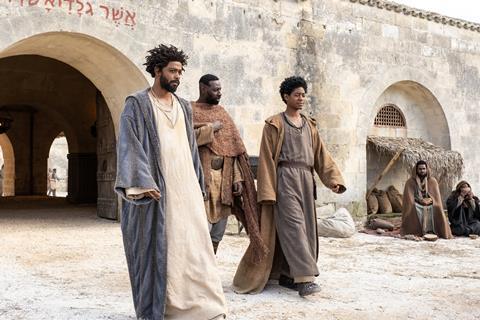Jeymes Samuel returns to the Biblical epics of yore with this rambunctious faith film

Dir/scr: Jeymes Samuel. US. 2023. 129 mins.
A pop-gospel spectacle, the second film from Jeymes Samuel is a throwback to the era of Hollywood Biblical epics, which stops along the way to tap into the funk-powered spirituality of Black Moses-era Isaac Hayes and a touch of Python irreverence. The Book Of Clarence is a New Testament-adjacent tale, set in Jerusalem, 29 A.D, of an opportunist unbeliever named Clarence (LaKeith Stanfield in a dual role – he also plays Clarence’s twin brother, the apostle Thomas) who fraudulently sets himself up as a new Messiah. It’s an ambitious project that manages to be both casually sacrilegious and utterly earnest about its ultimate message of faith.
Manages to be both casually sacrilegious and utterly earnest about its ultimate message of faith
It’s entertaining stuff, with a subversive swagger and a cheekiness that is not generally associated with films of faith. But the cheerfully disorderly tonal collision – the film combines levitating robed stoners getting high on homegrown ‘lingon weed’ with harrowing scenes of brutality and crucifixion – may be a turn-off to the more conservative end of the audience spectrum for Christian cinema. As with his previous film, the all-Black Western The Harder They Fall, Samuel filters a well-worn genre through a Black lens, and has a great deal of fun doing so.
Shot by Rob Hardy, with the town of Matera in southern Italy doubling for Jerusalem’s lawless lower city, the picture looks a treat, with saturated colours that leap off the screen in a nod to the muscular technicolor hues of films like The Greatest Story Ever Told, Jesus Of Nazareth and Ben Hur. And the colour palette is not the only inspiration taken from Ben Hur – the film opens with a precipitous cliff road chariot race, with Clarence and his sidekick Elijah (RJ Cyler) competing against a speed-queen reimagining of Mary Magdalene (Teyana Taylor).
Clarence’s humbling defeat costs him more than his pride – he is deeply (and soon to be fatally) in debt to Jedediah the Terrible (Babs Olusanmokun), and, somewhat inconveniently, in love with Jedediah’s younger sister Varinia (Anna Diop). Desperate, Clarence reasons that, although he scoffs at the idea of God, getting saved might yet buy him some clemency from Jebediah. A slap-happy John The Baptist (David Oyelowo) is having none of it, however. It’s shortly after this, elevated by the ‘ungodly herbs’ that Clarence sells to the potheads of ancient Jerusalem, that he has a (literal) lightbulb moment (the fact that lightbulbs won’t be invented for another 1851 years is a minor quibble with a film that also posits that if you smoke enough weed, you can fly).
It’s a film that, for the first two-thirds at least (the picture is divided into three chapters or ‘Books’), defiantly refuses to take itself seriously. The easygoing, irreverent groove of the storytelling leans predominantly on humour as a means to smooth over the bumps and inconsistencies in the plot. But as the film moves into its more sober and enlightened third act, in which Clarence’s lack of faith in the existence of a higher power is replaced with a certain and unshakeable faith, the film’s tonal collisions become more jarring.
It certainly won’t work for everyone, but the picture’s energy is infectious, thanks in part to Samuel’s self-penned score (augmented by funk classics like The Jackson Sisters’ ’I Believe In Miracles’, and The Jones Girls’ ’Nights Over Egypt’). It’s perhaps best approached with the understanding that, while the film’s foundation of faith is genuine, absolutely nothing is sacred.
Production companies: Legendary Entertainment, TriStar Pictures
International sales: Sony Pictures Entertainment
Producers: Jay-Z, James Lassiter, Tendo Nagenda, Jeymes Samuel
Cinematography: Rob Hardy
Editing: Tom Eagles
Production design: Peter Walpole
Music: Jeymes Samuel
Main cast: LaKeith Stanfield, Omar Sy, Anna Diop, RJ Cyler, David Oyelowo, Micheal Ward, Alfre Woodard, Teyana Taylor, Caleb McLaughlin, Eric Kofi-Abrefa, Marianne Jean-Baptiste, James McAvoy, Benedict Cumberbatch






![The Brightest SunScreen[Courtesy HKIFF]](https://d1nslcd7m2225b.cloudfront.net/Pictures/274x183/3/5/0/1448350_thebrightestsunscreencourtesyhkiff_312678.jpg)















![The Brightest SunScreen[Courtesy HKIFF]](https://d1nslcd7m2225b.cloudfront.net/Pictures/100x67/3/5/0/1448350_thebrightestsunscreencourtesyhkiff_312678.jpg)

